The Cotton Bowl Fallout:How BYU’s exclusion in the 1996 Bowl Alliance led to change in college football
Story by Cameron Muh. Cover art by Emme Franks.
This story is part of the November 2021 issue of the Daily Universe Magazine and Universe Live Magazine Show.
On December 7, 1996, No. 6 (12-1) BYU and No. 20 (10-1) Wyoming squared off at Sam Boyd Stadium in Las Vegas in the Western Athletic Conference (WAC) Championship game.
Both the WAC and the Big 12 debuted conference championship games that season, joining the SEC, whose championship game had begun four seasons prior. All three conferences held championship games that Saturday, giving BYU and the WAC the nation’s undivided attention.
On a national stage and with representatives from each of the major bowls in attendance, BYU took a 13-0 lead into the half and would eventually win in overtime, 28-25, improving to 13-1 on the season.
The Cougars moved up to No. 5 in the AP Poll the next day but were ultimately denied the opportunity to play in a Bowl Alliance bowl game, the 1996 equivalent of a New Year’s Six bowl game. BYU’s exclusion sparked a debate between those who believed they deserved a shot and those who knew they’d never be given that chance.
The case for BYU
With a No. 5 AP ranking and 13-1 record, BYU certainly looked like it was in a good place heading into Sunday. Winners of 11-straight games, WAC champions and with an impressive win over then No. 13 Texas A&M to open the season, the Cougars’ only blemish was a 12-point loss at Washington in week 3.

“I don’t think anybody had to make a case. It was an easy case, they were 12-1 and ranked number six in the country going into the WAC championship game,” WAC commissioner Karl Benson said. “Everyone expected that if they beat Wyoming, they would certainly be into the game (Fiesta Bowl). That was the promotion of the WAC championship game. If BYU wins, they’re a lock for the Fiesta Bowl.”
Having taken care of business on the field against Wyoming, BYU’s fate was left in the hands of the Bowl Alliance decision makers off the field.
Selection show
Set to air on CBS at 5:30 p.m. EST the following day, the selection show would announce all the bowl matchups, concluding with the three Alliance bowls: the Nokia Sugar Bowl, Tostitos Fiesta Bowl and FedEx Orange Bowl.
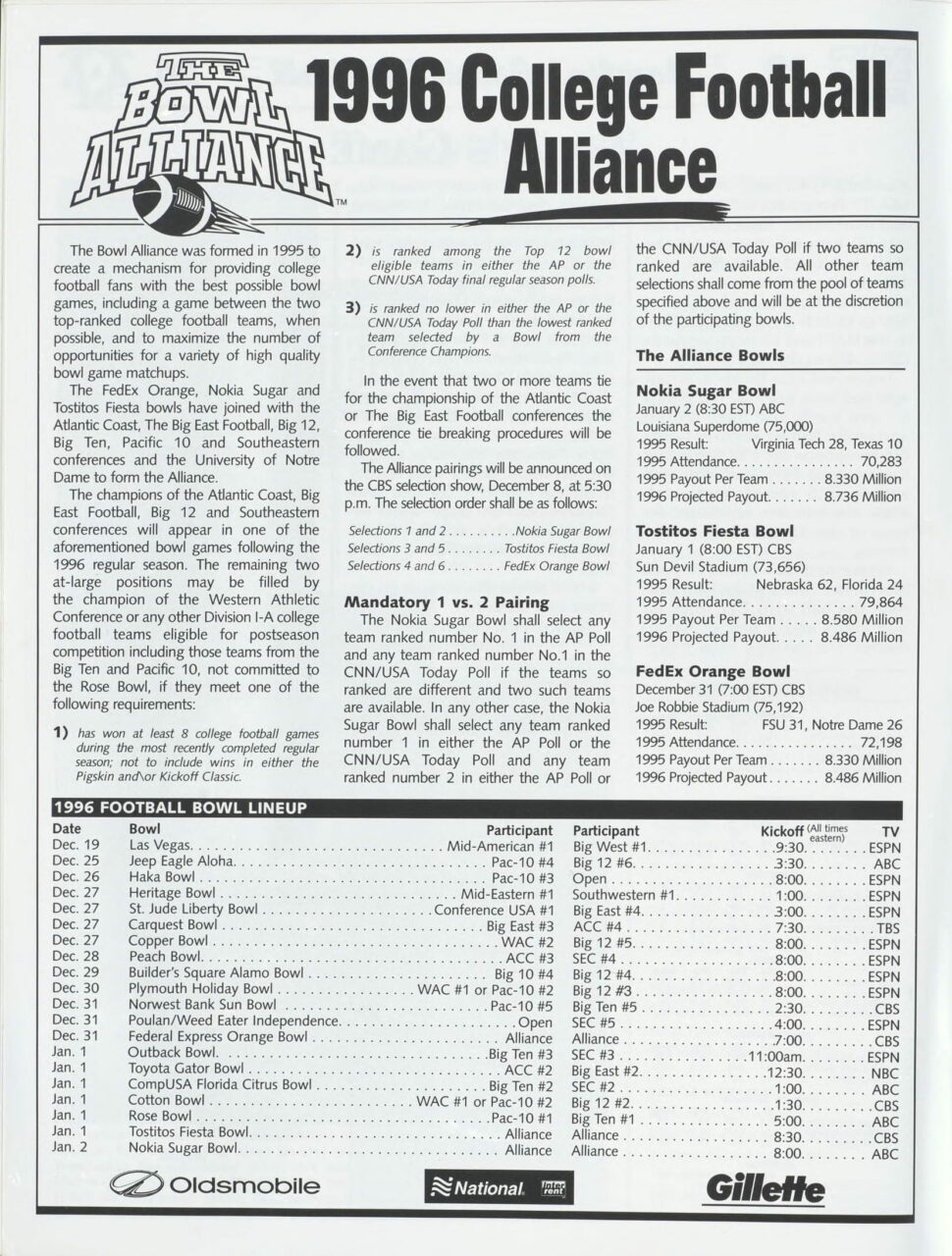
Four of the six Bowl Alliance bids would go to the conference champions, which were Florida State (ACC), Virginia Tech (Big East), Texas (Big 12) and Florida (SEC). The remaining two bids would be for at-large teams, BYU’s presumed way in.
No. 1 Florida State (11-0) and No. 3 Florida (11-1) were selected to play in the Sugar Bowl, which was designated as that season’s championship game. As champions of the Pac-10 and Big Ten, No. 2 Arizona State (11-0) and No. 4 Ohio State (10-1) were contractually obligated to play in the Rose Bowl, which at the time was not one of the Alliance bowls.
Up next was the Fiesta Bowl, the bowl game everybody assumed BYU was headed to. They went a different direction however, choosing No. 7 Penn State (10-2) and No. 20 Texas (8-4) to play in it. No. 6 Nebraska (10-2) and No. 10 Virginia Tech (10-1) were then selected for the Orange Bowl, leaving BYU out.
“The one thing that happened on that championship Saturday that was unexpected was that Texas upset Nebraska in the Big 12 championship game,” Benson said. “That’s what ultimately allowed the powers to leave out BYU.”
Nebraska, who was ranked No. 3 heading into its Big 12 championship game against Texas, suffered a 10-point loss to Texas, its only loss of the season. The Cornhuskers took one of the at-large spots, but Penn State, who had lost twice that season, including to Ohio State by a score of 38-7, somehow scooped up the second and final at-large bid.
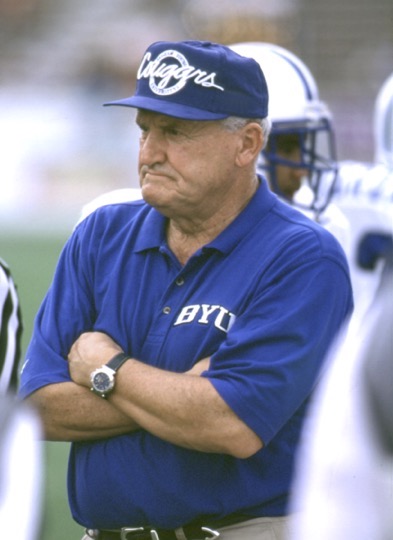
“As good a day as December 7, 1996, was, one of the most disappointing days in BYU and WAC history would have been Sunday, December 8,” Benson said. “Coach Edwards was flown to New York, taken to the studios for the selection show and sat there while he heard that BYU didn’t get selected. He went out of the studios and had to take a cab because nobody was there to take him to his hotel. It was a disappointing, disappointing day.”
Aftermath
BYU director of athletics at the time, Rondo Fehlberg, echoed Benson’s sentiment. “The feeling was disappointment,” he said. “These people were sure we were going to be there; sure we were going to be admitted. For some it was anger, for others it was sorrow. We all have different ways of dealing with unmet expectations. The great challenge for the athletic director is you’re going to have a lot of people reaching out to you with the entire range of those emotions anytime these big disappointments happen, especially when those disappointments seem either unfair or unjustified.”
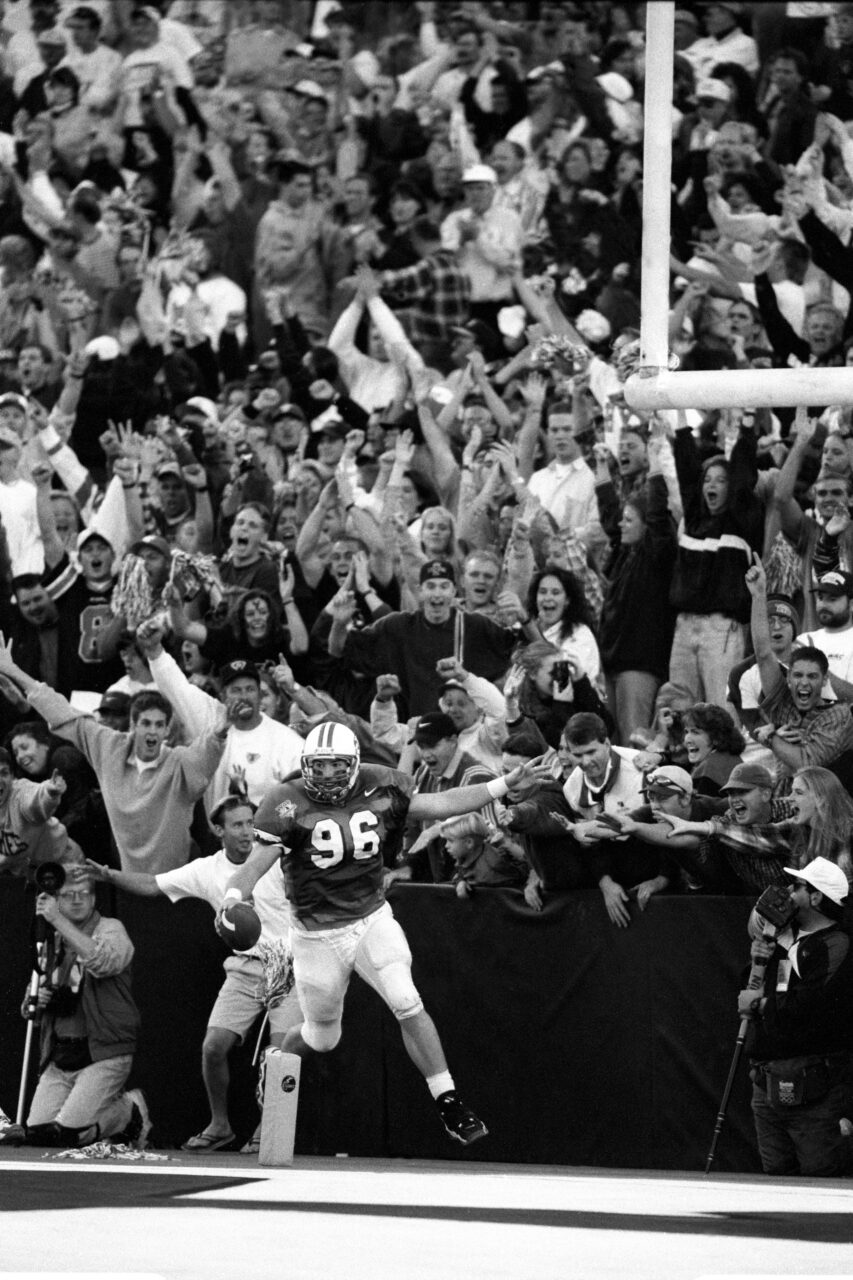
BYU tight end Chad Lewis shared his feelings following the team’s exclusion that year and his beliefs on the bowl system that was in place.
“If the Alliance bowl was set up to pair the best teams against each other,” Lewis said, “then why are you taking two-loss teams? We were a good team, we felt like we deserved to have the chance to fight for a national championship or one of the top bowls. The system felt a little rigged.”
He continued, “They created a system to try and have more justice in the college football system. That justice was trying to boil it down to who were the best teams this year. I felt like we were one of those best teams that year. And that system which should have put us in one of those games, did not do that.”
Fehlberg recalled their being an upsetting feeling around Provo. He was convinced that BYU had everything in terms of logic and substance, but it still didn’t happen. This feeling didn’t just exist amongst Cougar faithful.
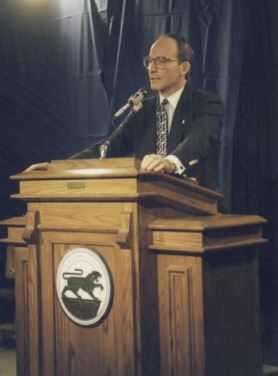
“There were so many people who viewed it as a complete and unfair conspiracy,” Fehlberg said. “Up to that time, there were a lot of people who were not BYU fans that became almost overnight supporters of BYU because they felt BYU was treated so unfairly.”
Deseret News sports columnist Dick Harmon recounted how when the Alliance bowls were announced, the Orange Bowl president said, “what better thing would you want than two 10-win teams to play in a bowl game.”
“Well, how about a 13-1 team that’s ranked number five?” Harmon said. “So you can see the stupidity of what that kind of statement and attitude of blue blood arrogance was back then.”
Harmon also shared what the feeling around smaller conferences like the WAC was like at the time. “There was a big uprising in the non-power conferences. They were just being cheated. It just was such a big hypocritical thing by college football that they did this.”
The national media shared a similar feeling as well. Benson made the trip to New York for the annual National Football Foundation Hall of Banquet two days after the selection show.
“When I arrived, I was met by members of the media who were appalled,” he said. Newsday’s Ivan Maisel, who has since written for Sports Illustrated and ESPN, “wrote that it was one of the most egregious outcomes he’d ever been covering sports.”
Speaking on BYU’s exclusion, Benson concluded, “Not just in the WAC and BYU, throughout college sports and throughout sports in general, it’s one of the biggest injustices that’s ever occurred.”
The root of the problem
Historically, the “Power 5” conferences, as they’re known today, have always ruled the college football scene. Typically dominating on the field, these same teams have competed for national championships or appearances in big bowl games, allowing the money that came with those appearances to remain in-house.
“It looked like a big conspiracy, it looked like an antitrust situation, because it was all about money,” Harmon said. “The bowl tie-ins that they had back then, they were not going to let that money leave the big power conferences. The Southeastern Conference (SEC), the Big Ten, the Big 12, they were not going to let the money leave that arena. It was just nothing but a money grab.”
In 1996, teams selected to play in Alliance bowl games were slated to share around $8 million with their conference. In contrast, BYU was given roughly $2.1 million for participation in the Cotton Bowl, and that money was distributed amongst all the WAC teams.
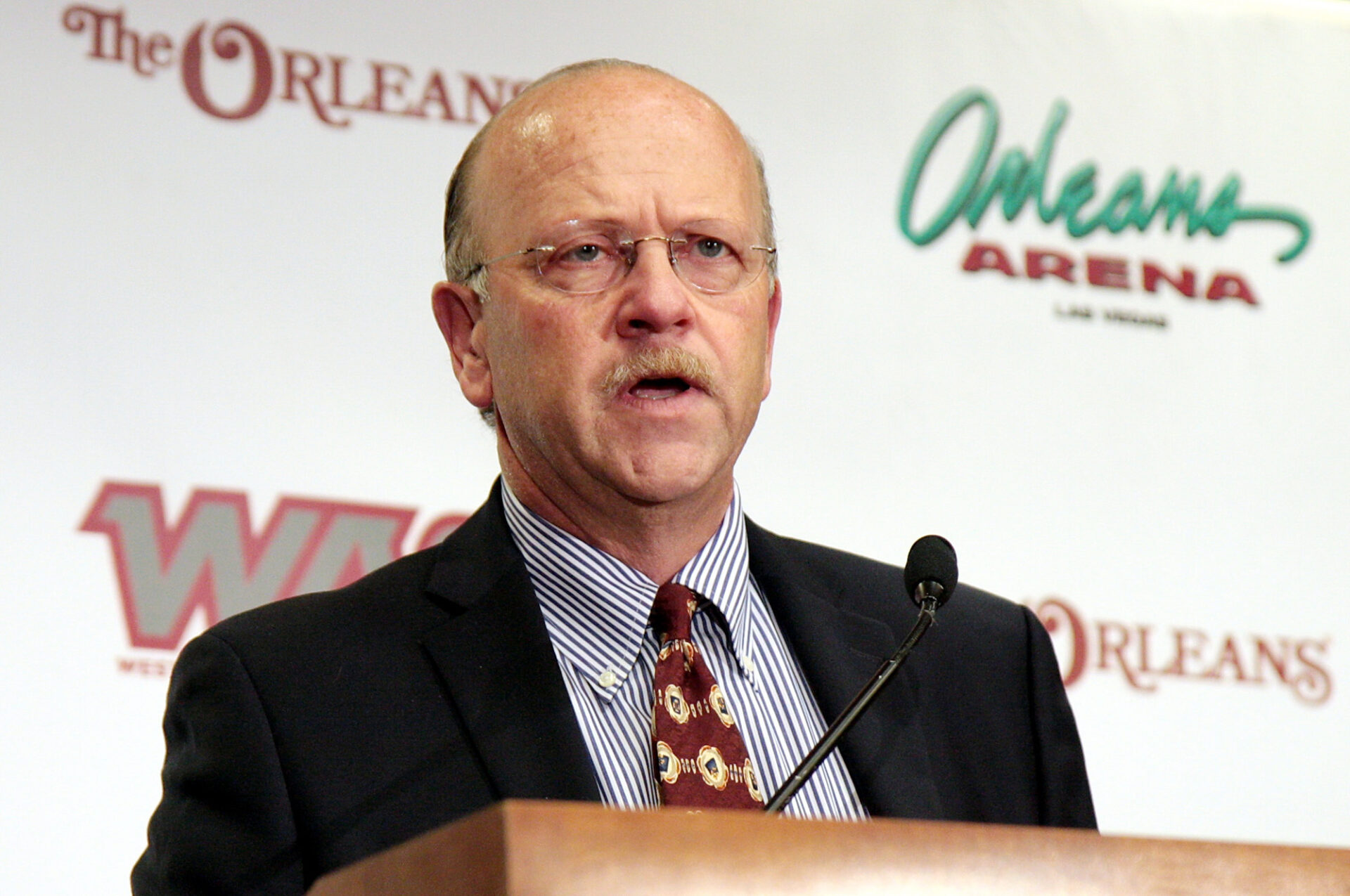
“It ended up being unfortunately politics that got in the way of them (BYU) not playing in the Fiesta Bowl and not being included in that,” Benson said. “Nobody to this day will own up as to why Penn State was selected over BYU.”
Fehlberg alluded to the real reason why the Nittany Lions were selected over the Cougars. “In the end, the golden rule is always going to be the last word,” he said. “He who has the gold rules. So it’s about the money”.
Hearings and lawsuits
What ensued in the spring of 1997 was a call to action from the WAC, the premier non-Power 5 conference at the time, to college football: a demand for change in bowl representation.
The WAC attempted to engage in a compromise on how to keep such an exclusion from happening again and to create a way for the WAC to get an automatic bid into the Alliance bowl games.
“When those talks didn’t materialize into anything, then there was the threat of the lawsuit,” Benson said. “Ultimately, Senator Hatch and Senator Bennett called for the judiciary committee to review college football and assess whether there were antitrust violations.”
A Senate Judiciary Committee hearing was held in May of 1997. Among those called upon to testify were U.S. senators, conference commissioners, coaches and players, including BYU’s Lewis.
Watch full video of the hearing at:
https://www.c-span.org/video/?81501-1/college-football-bowl-alliance-part-1
https://www.c-span.org/video/?81519-1/college-football-bowl-alliance-part-2
“It was a great opportunity to go back and speak in front of the Senate Judiciary Committee and realize that they were taking a good look at that, because they wanted to see if the Bowl Alliance was in violation of U.S. antitrust laws,” Lewis said. “My involvement in that was a character witness or personal perspective of being someone in that situation.”
In his statement, Lewis explained that BYU gave him a fair chance to showcase his talents at BYU and eventually earn a scholarship. A fair shot is all that he would’ve hoped for his team that season.
“We thought we deserved the chance to play in one of the Alliance bowls, which were set up to match the nation’s best teams to play for a national championship,” Lewis said. “However, it seemed clear to us that it was money and not fairness that was driving the Alliance. We feel like we’ve proven that we can compete with the very best. As a team we just wanted what we thought was a fair shot. That’s what I received as a walk on, and that’s what we wanted to receive as the fifth ranked team in the nation.”
Lewis compared the excitement of sports to Cinderella and beating the odds. He urged the Alliance not to “crush the glass slipper before everyone has a chance to try it on.”
“My only question is the fairness of the Bowl Alliance. Is it fair that a proven team like BYU was not invited to play in a Bowl Alliance game? Is it fair not to afford every team in the nation an equal opportunity to excel and shoot for a national championship? Is it fair to allow certain conferences to receive guaranteed millions even though they might not be the highest ranked teams? The only thing athletes want is a fair chance to compete for the championship.”
Many senators were also present, testifying for and against the Bowl Alliance and the system that was in place.
Kentucky senator Mitch McConnell commented on the purpose of the hearing being not for the Power 5 teams, but rather for the non-Power 5 teams and giving them a chance to compete.
McConnell continued, “The basic message is that if David wants to slay Goliath, he better do it during basketball season. He won’t be allowed to play Goliath when the football postseason rolls around. College football has no room for the underdog. In fact, as evidenced by the 1997 New Year’s bowls, college football doesn’t even have room for the top ranked teams, unless those teams are members of the exclusive Bowl Alliance.”
Hammering home his points, McConnell said that the Alliance had the opportunity to prove the value of its system in the 1996 season but didn’t.
“The Alliance established what were supposed to be new rules. BYU and Wyoming played by the new Alliance rules, and just as they were about to score, the Alliance moved the goalpost… BYU is the perfect test case for open competition, the Alliance plain and simple failed the test. This issue is about more than just football, apple pie and alma mater, this is about big money.”
Also pointing to money being a key problem, Utah senator Robert Bennett said, “The real issue here is money, not prestige for alma mater or praise for the home school.”
Bennett, a graduate of the University of Utah, quoted a Washington Post sports reporter that commented on BYU’s exclusion.
“The Bowl Alliance messed up the assignments. I don’t blame BYU for wanting to file a lawsuit, which the school considered, but decided against. You finished 13-1 and in the top-five, somebody ought to find a spot for you in one of these bowl games. The bowl people and the TV execs will tell you all this mumbo jumbo about BYU not drawing the big TV numbers, but guess what? The BYU-Wyoming WAC Championship attracted a bigger TV audience than did Nebraska-Texas and Florida-Alabama. Who would you rather watch any day of the week, Alabama, or BYU? BYU is made for TV, the way it plays. And how about Wyoming, which was 10-2 but still isn’t going anywhere, while 6-5 teams that will put you stone-cold asleep, aren’t going bowling. That’s embarrassing to college football or ought to be.”
While BYU was snubbed from the Bowl Alliance games, Wyoming wasn’t invited to any bowl games that season.
Wyoming senator Mike Enzi added, “The current Alliance, whether true or not, gives the perception that they have stifled genuine competition and placed college football at the mercy of a coalition that appears to be more interested in money and power than in the best interest of the players or the fans or the colleges that they represent.”
Benson, as part of his statement in the hearing, said, “The alliance and postseason football is flawed. The WAC desires a system that allows its student-athletes the same opportunities as other conferences to compete and a system that allows WAC schools a fair chance to compete for the enormous revenues that have been created. There has to be a better way to operate postseason football.”
Change
As a result, “there was some justice served,” Benson said. “They changed the access rules to provide an automatic if you finished the season ranked in the top 6, which was called ‘the BYU rule’. The system was changed to provide access to keep a team ranked in the top six from not getting in.”
Lewis believes that BYU’s exclusion in the 1996 Alliance bowls played a big role in influencing change in college football.
“If they’re going to hold Senate Judiciary committees over it, then they put everyone on notice,” Lewis said. “Here’s your system, is your system rigged? That was really the question. Is your system fair? You just put a system together that the whole country is looking at and expecting to be fair. Is it? Well, it was changed. It was thrown out the window. The Bowl Alliance system out, a new system was put in place.”
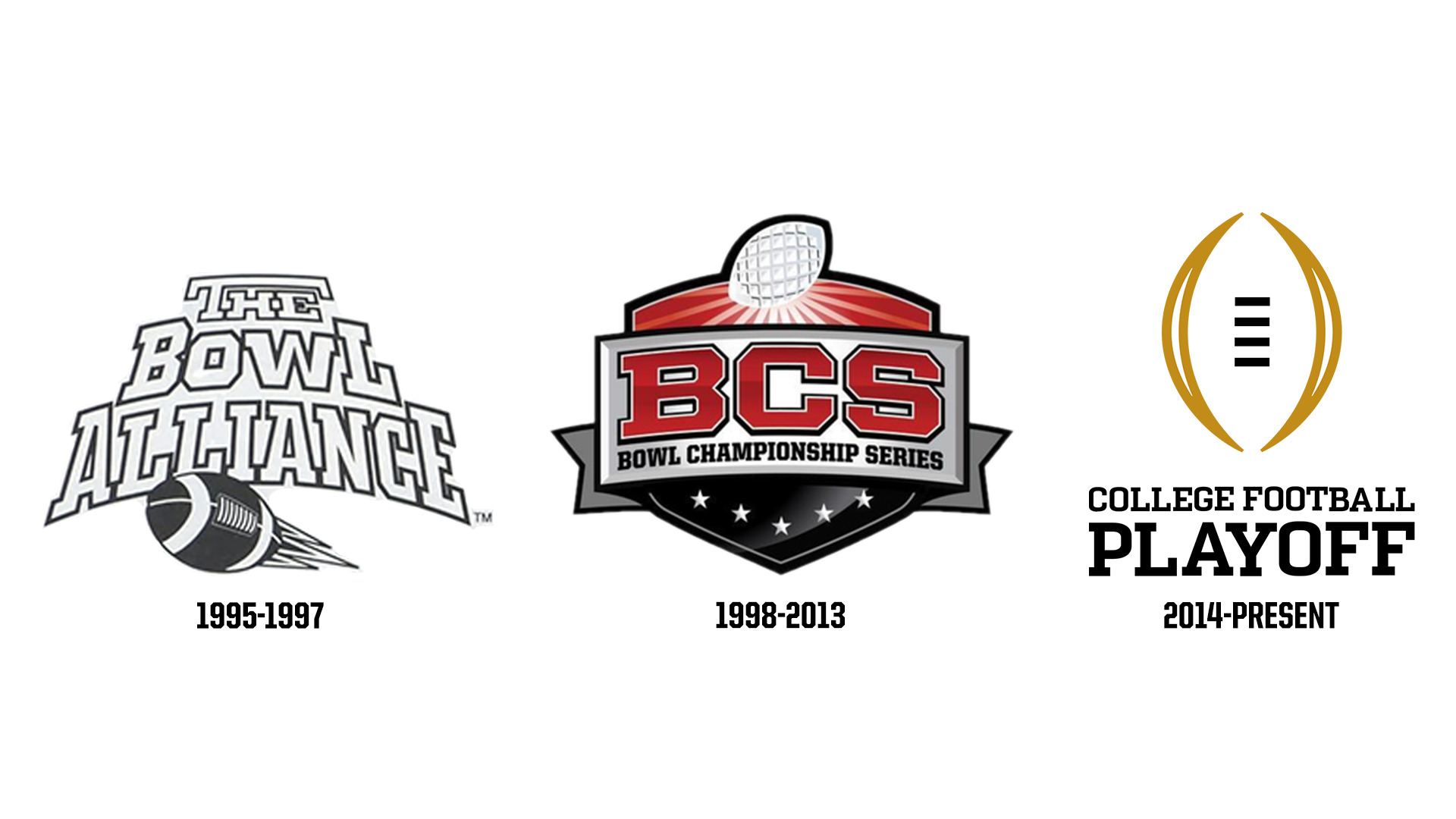
The Bowl Championship Series (BCS) replaced the Bowl Alliance in the 1998-99 season until it too was replaced by the College Football Playoff (CFP), the current college football bowl organization, in 2014-15.
Silver lining
One can’t help but wonder what could’ve been for BYU in 1996. What if they hadn’t lost to Washington on the road in week 3? What if Nebraska didn’t upset Texas in the Big 12 championship game? Would the Cougars have been admitted then?
Despite being snubbed from a birth in the 1996 Fiesta Bowl, BYU football still made history that season. The Cougars played in the school’s first and only “New Year’s Six” bowl game, beating No. 14 Kansas State in the Cotton Bowl, 19-15.
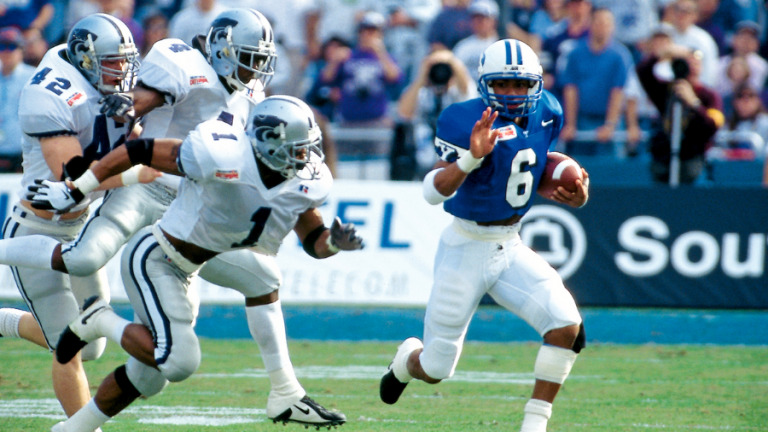
Finishing the season 14-1, BYU also became the first team in the modern era (post-1937) to play 15 games in a season, a feat only accomplished two other times since, in 2003 and 2019.
“I wish we would have been given the opportunity to fight to play in one of those top bowl games,” Lewis said. “We were really grateful to play in the Cotton Bowl because that was still a big-time bowl and it was New Year’s Day. But if you’re competitive, which we are as football players, and you feel like you deserve a right to play in what they are saying are the top couple bowls, well we wanted to be there.”
The legacy of that 1996 BYU football team lives on —in the 11-1 season and No. 11 final ranking a year ago and this season’s strong start— but more importantly by influencing change in college football and helping to give every team a chance: a shot to play on the biggest stages at the end of the season.

